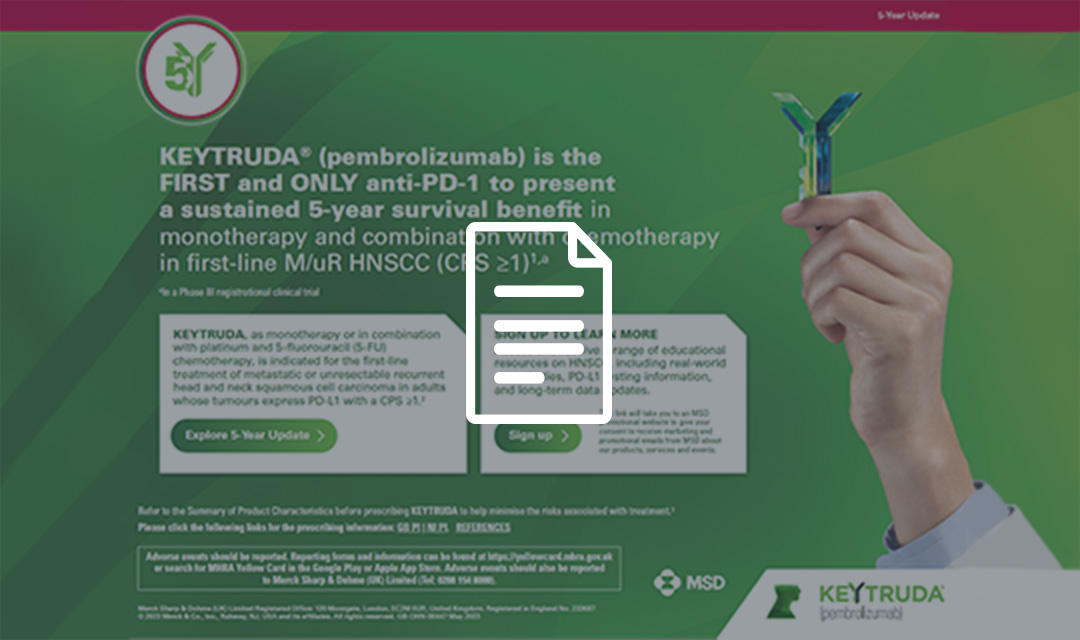About KEYTRUDA in HNSCC
Prescribing Information (Great Britain) & Prescribing Information (Northern Ireland) [External links]
Explore the potential of KEYTRUDA in M/uR HNSCC
Use the treatment algorithm below, which is adapted from ESMO guidelines, to explore KEYTRUDA as first-line treatment of metastatic or unresectable recurrent HNSCC in adults with PD-L1 expression of CPS ≥ 1.1,2

This treatment algorithm has been adapted from Figure 5, ESMO guidelines for the management of recurrent and/or metastatic disease not amenable to curative radiotherapy or surgery and adapted for relevance to UK funding.2 For full HNSCC management guidelines please refer to the full ESMO guidelines.2 Refer to the appropriate SmPC before prescribing any product to minimise adverse events.
Discover how KEYTRUDA could change your patients’ outcomes
KEYTRUDA Monotherapy
(KEYNOTE-048 results)
KEYTRUDA +Chemotherapy
(KEYNOTE-048 results)
KEYTRUDA, as monotherapy or in combination with platinum and 5-fluorouracil (5-FU) chemotherapy, is indicated for the first-line treatment of metastatic or unresectable recurrent head and neck squamous cell carcinoma in adults whose tumours express PD-L1 with a CPS ≥ 1.1
The recommended dose of KEYTRUDA in adults is either 200 mg every 3 weeks or 400 mg every 6 weeks, administered as an intravenous infusion over 30 minutes.1
KEYTRUDA monotherapy is recommended as an option for untreated metastatic or unresectable recurrent HNSCC, in adults whose tumours express PD-L1 with a CPS ≥1, regardless of where the cancer started.4
KEYTRUDA should be stopped at 2 years of uninterrupted treatment, or earlier if disease progresses.4
This advice applies only if the company provides KEYTRUDA according to the commercial arrangement.4
KEYTRUDA is accepted for restricted use within NHS Scotland.5
In Scotland, KEYTRUDA can be used as a monotherapy or in combination with 5-FU chemotherapy for first-line treatment of M/uR HNSCC in adults whose tumours express PD-L1 with a CPS ≥1.5
This advice applies only in the context of an approved NHS Scotland Patient Access Scheme (PAS) arrangement delivering the cost effectiveness results upon which the decision was based, or a PAS/list price that is equivalent or lower.5
Treatment with KEYTRUDA is subject to a 2-year clinical stopping rule.5
PD-L1 testing supports a targeted treatment approach for all appropriate patients with M/uR HNSCC*1
CPS ≥ 1 in the KEYNOTE-048 study1

*The KEYNOTE-048 study employed the PD-L1 IHC 22C3 pharmDx assay (Agilent Technologies, Carpinteria, CA, USA)1,11
To find out more about the different types of patients who could benefit from KEYTRUDA, arrange a discussion with an MSD representative
Abbreviations
5-FU = 5-Fluorouracil; CPS = Combined Positive Score; ESMO = European Society For Medical Oncology; HNSCC = Head And Neck Squamous Cell Carcinoma; M/uR = Metastatic Or Unresectable Recurrent; NHS = National Health Service; NICE = National Institute For Health And Care Excellence; PAS = Patient Access Scheme; PD-1 = Programmed Cell Death-1; PD-L1 = Programmed Death Ligand-1; SmPC = Summary Of Product Characteristics; SMC = Scottish Medicines Consortium; TPS = Tumour Proportion Score.
References
- KEYTRUDA Summary of Product Characteristics.
- Machiels J-P et al. Ann Oncol. 2020;31:1462–75.
- National Cancer Drugs Fund List ver1.181 02-Aug-21 HNSCC.
Available at https://www.england.nhs.uk/publication/national-cancer-drugs-fund-list/ - NICE. Pembrolizumab for untreated metastatic or unresectable recurrent head and neck squamous cell carcinoma. 2020.
Available at https://www.nice.org.uk/guidance/ta661/chapter/1-Recommendations - Scottish Medicines Consortium. Pembrolizumab 25mg/mL concentrate for solution for infusion and 50mg powder for concentrate for solution for infusion (KEYTRUDA®). 2020.
Available at: https://www.scottishmedicines.org.uk/media/5369/pembrolizumab-keytruda-hnscc-final-august-2020docx-for-website.pdf - Erbitux (cetuximab) Summary of Product Characteristics.
- NICE. Cetuximab for treating recurrent or metastatic squamous cell cancer of the head and neck. 2017.
Available at https://www.nice.org.uk/guidance/ta473/chapter/1-Recommendations - Opdivo (nivolumab) Summary of Product Characteristics.
- NICE. Nivolumab for treating squamous cell carcinoma of the head and neck after platinum-based chemotherapy. 2017.
Available at: https://www.nice.org.uk/guidance/ta490/chapter/1-Recommendations - Scottish Medicines Consortium. Nivolumab (Opdivo).
Available at https://www.scottishmedicines.org.uk/medicines-advice/nivolumab-opdivo-fullsubmission-126117/ - Agilent. PD-L1 IHC 22C3 pharmDx Interpretation Manual – HNSCC.
- Burtness B et al. Lancet. 2019:394;1915–28.
Supporting documentation
Prescribing Information (Great Britain) & Prescribing Information (Northern Ireland)
By clicking the links above you will leave the MSD Connect website and be taken to the emc PI portal website.


